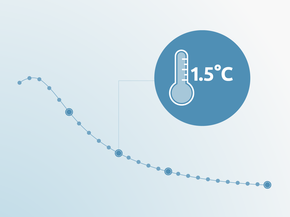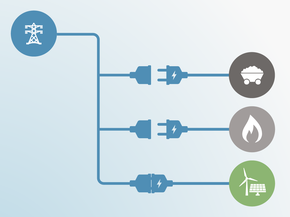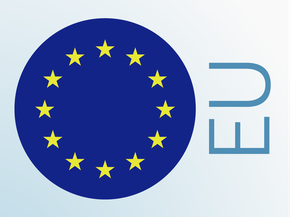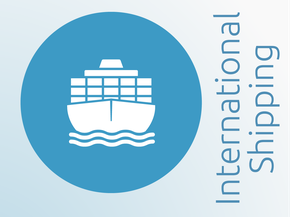Critically Insufficient4°C+
World
NDCs with this rating fall well outside of a country’s “fair share” range and are not at all consistent with holding warming to below 2°C let alone with the Paris Agreement’s stronger 1.5°C limit. If all government NDCs were in this range, warming would exceed 4°C.
Highly insufficient< 4°C
World
NDCs with this rating fall outside of a country’s “fair share” range and are not at all consistent with holding warming to below 2°C let alone with the Paris Agreement’s stronger 1.5°C limit. If all government NDCs were in this range, warming would reach between 3°C and 4°C.
Insufficient< 3°C
World
NDCs with this rating are in the least stringent part of a country’s “fair share” range and not consistent with holding warming below 2°C let alone with the Paris Agreement’s stronger 1.5°C limit. If all government NDCs were in this range, warming would reach over 2°C and up to 3°C.
2°C Compatible< 2°C
World
NDCs with this rating are consistent with the 2009 Copenhagen 2°C goal and therefore fall within a country’s “fair share” range, but are not fully consistent with the Paris Agreement long term temperature goal. If all government NDCs were in this range, warming could be held below, but not well below, 2°C and still be too high to be consistent with the Paris Agreement 1.5°C limit.
1.5°C Paris Agreement Compatible< 1.5°C
World
This rating indicates that a government’s NDCs in the most stringent part of its “fair share” range: it is consistent with the Paris Agreement’s 1.5°C limit.
Role model<< 1.5°C
World
This rating indicates that a government’s NDC is more ambitious than what is considered a “fair” contribution: it is more than consistent with the Paris Agreement’s 1.5°C limit.
Sources
List of references
- AtlasSolar. (2017). Retrieved August 23, 2017, from http://atlassolar.kz/
- Central Intelligence Agency. (n.d.). The World Factbook — Central Intelligence Agency. Retrieved March 1, 2018, from https://www.cia.gov/library/publications/the-world-factbook/rankorder/2253rank.html
- Climate Action Tracker. (2017). Foot off the gas: increased reliance on natural gas in the power sector risks an emissions lock-in. Climate Action Tracker ( Climate Analytics, Ecofys, NewClimate Institute). Retrieved from https://newclimateinstitute.files.wordpress.com/2017/06/cat-2017-06-16-decarbonisationseries-naturalgas2.pdf
- Climate Action Tracker. (2018). For the Talanoa dialogue : Steps towards global decarbonisation in key emitting sectors. Retrieved from https://climateactiontracker.org/documents/394/2018-Oct_TalanoaSubmission_ClimateActionTracker_FINAL.pdf
- IEA. (2015). Eastern Europe, Caucasus and Central Asia: Energy Policies Beyond IEA Countries, 476.
- IMF. (2017). World Economic Outlook (October 2017) - Real GDP growth. Retrieved March 1, 2018, from http://www.imf.org/external/datamapper/NGDP_RPCH@WEO/KAZ
- International Carbon Action Partnership. (2018). Kazakhstan Emissions Trading Scheme (KAZ ETS). Retrieved from https://icapcarbonaction.com/en/?option=com_etsmap&task=export&format=pdf&layout=list&systems[]=46
- International Crisis Group. (2011). Central Asia: Decay and Decline. Bishkek/Brussels. Retrieved from https://d2071andvip0wj.cloudfront.net/201-central-asia-decay-and-decline.pdf
- kazinform. (2018). Kazakhstan to launch coalbed methane exploration and production. Retrieved October 25, 2018, from https://www.inform.kz/en/kazakhstan-to-launch-coalbed-methane-exploration-and-production_a3314790
- Ministry of Energy of the Republic of Kazakhstan. (2017). Seventh national communication and third biennial report of the republic of Kazakhstan.
- Refineries in Kazakhstan increasing production volumes. (2018). Retrieved October 25, 2018, from https://primeminister.kz/en/news/zasedanie-pravitelstva-rk/npz-kazahstana-narashchivaut-obemi-proizvodstva-k-bozumbaev-16838
- Republic of Kazakhstan. (2013). Third-Sixth National Communication of the Republic of Kazakhstan to the UN Framework Convention on Climate Change. Retrieved from http://unfccc.int/files/national_reports/annex_i_natcom_/application/pdf/kaz_nc3,4,5,6_eng.pdf
- Republic of Kazakhstan. (2015). Concept for transition of the Republic of Kazakhstan to Green Economy. https://doi.org/10.1017/CBO9781107415324.004
- Republic of Kazakhstan. (2016a). Intended Nationally Determined Contribution -Submission of the Republic of Kazakhstan. Retrieved from http://www4.unfccc.int/ndcregistry/PublishedDocuments/Kazakhstan First/INDC Kz_eng.pdf
- Republic of Kazakhstan. (2016b). On approval of the development targets of the renewable energy sector. Retrieved August 10, 2017, from http://adilet.zan.kz/rus/docs/V1600014489
- The Times of Central Asia. (2018). Kazakhstan to increase oil production to over 100 million tons in 2025. Retrieved October 25, 2018, from https://www.timesca.com/index.php/news/19960-kazakhstan-to-increase-oil-production-to-over-100-million-tons-in-2025
- UNFCCC. (2012a). Information by Parties included in Annex I listed in annex 1 to decision 1/CMP.7 on their quantified emission limitation or reduction objectives for the second commitment period under the Kyoto Protocol. Retrieved from http://unfccc.int/resource/docs/2012/awg17/eng/misc01.pdf
- UNFCCC. (2012b). Information by Parties included in Annex I listed in annex 1 to decision 1/CMP.7 on their quantified emission limitation or reduction objectives for the second commitment period under the Kyoto Protocol Submissions from Parties Addendum. Retrieved from http://unfccc.int/resource/docs/2012/awg17/eng/misc01a02.pdf
- UNFCCC. (2017). UNFCCC AWG-KP Submissions 2017. Common Reporting Format. Bonn, Germany: United Nations Framework Convention on Climate Change.
- UNFCCC. (2018). UNFCCC AWG-KP Submissions 2018. Common Reporting Format. Bonn, Germany.
- World Bank. (2016). Oil rents (% of GDP) | Data. Retrieved from http://data.worldbank.org/indicator/NY.GDP.PETR.RT.ZS
- World Bank. (2018a). Economic outlook for the Europe and Central Asia region. Retrieved from http://pubdocs.worldbank.org/en/465111512062598806/Global-Economic-Prospects-Jan-2018-Europe-and-Central-Asia-analysis.pdf
- World Bank. (2018b). Kazakhstan Launches Online Platform for Monitoring and Reporting Greenhouse Gases. Retrieved February 27, 2018, from http://www.worldbank.org/en/news/press-release/2018/02/05/kazakhstan-launched-online-platform-for-ghg-reporting
Further analysis
Latest publications
Stay informed
Subscribe to our newsletter






